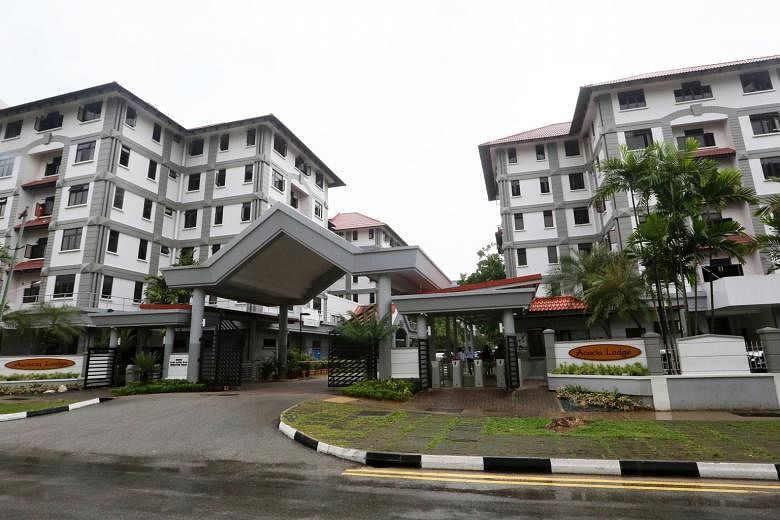In the crowded room of his dormitory in Singapore, metal scrap worker Rethnam's nightmares are about infection.
"I panic every time someone coughs or even sneezes," Mr Rethnam, who did not want to give his full name, told The Straits Times.
With construction work stopped since April 7 when circuit breaker measures came into effect in Singapore, Mr Rethnam, who hails from Sivagangai in Tamil Nadu, was initially worried whether he would receive this month's pay cheque.
But last week, he received $750.
Another worker, Mr Yeshudas, who also did not want to give his full name, said he was afraid when three workers in a room next to his tested positive for Covid-19 at Acacia Lodge.
But the 39-year-old Indian crane operator was soon moved into a different building and put in isolation with four others.
Mr Yeshudas was relieved to test negative for Covid-19 two weeks ago, and will get another test soon.
"The Ministry of Health calls thrice a day, and I have to take my temperature over a video call. I have no symptoms," he said in Tamil.
His employer provides three meals a day. The Government has given him a phone data card, with which he calls home every few hours.
His wife, Ms Shiny, lives in Kanyakumari, the southernmost tip of India. She said Mr Yeshudas transferred some money for their sons' school fees before Singapore's circuit breaker started.
-
350k
-
Estimated number of Indian nationals in Singapore. In Malaysia, there are 150,000 Indian expatriates and workers, and thousands more irregular and temporary pass workers.
Singapore is home to an estimated 350,000 Indian nationals.
But only "a few hundred" workers are among the 3,000 Indian citizens who have put in requests to be repatriated from Singapore, according to the Indian High Commission.
The High Commission in Singapore said that as of April 27, approximately 4,400 Indian nationals had tested positive for Covid-19. Of these, over 90 per cent were workers, a vast majority living in dormitories for foreign workers.
"The Government of India is working on a plan for repatriation of Indians … (Workers) will also be part of - indeed, a priority in - our repatriation plans," it said.
Across the border in Malaysia, Indian workers said they received no food or assistance from employers or the government.
There are an estimated 150,000 Indian expatriates and workers, but there are thousands more irregular and temporary pass workers.
Mr Kannan, 48, cried on the phone as he described the "shameful scene" every afternoon in his Kuala Lumpur neighbourhood.
"Charities come to feed 100 workers, but 500 line up. We fight like beggars for each lunch packet. I used to get $50 a day for house cleaning, but with no work now, I can't even afford the small change to put in the drinking water filter. I fill up my stomach with tap water," he said.
Mr Kannan, who declined to give his full name, has mentioned none of this to his family in Tamil Nadu.
The Selangor Mansion and Malayan Mansion flats in KL which house mainly foreign workers were put under an enhanced movement control order after 15 workers were found to be Covid-19 positive early last month.
Last Friday, the immigration authorities, which were conducting raids, arrested hundreds of undocumented workers in the eight-storey blocks, said Ms Sumitha Shaanthinni Kishna, director of migrant rights non-profit organisation Our Journey.
From a high window, Mr Shankar (name changed) watched officials in white protective gear pack 10 trucks with workers. "We are hungry, some may be sick. Is this the time to do arrests?" he asked.
Ms Kishna called the Malaysian government's actions counterproductive.
"They want people with symptoms to come forward for screening, but arresting workers will just make them go into hiding," she said.
It is not clear if the workers will be deported or isolated.











